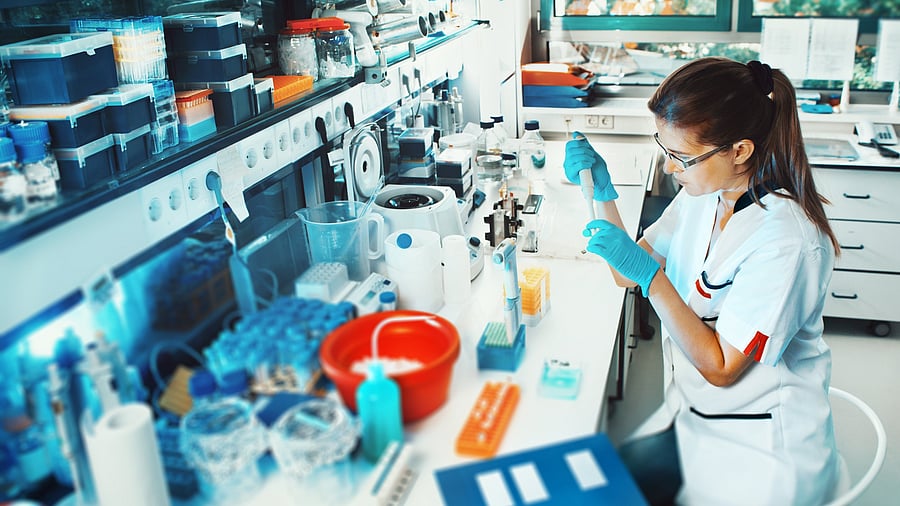
Young scientist works in modern biological lab
Credit: iStock Photo
When people visit a doctor, they expect the doctor to diagnose them and prescribe appropriate medicines to hasten recovery. There is a careful and elaborate process to make these medicines, test them and assess their side effects before they are made available. Pharmaceutical Science is a subject that covers all of these and much more.
A postgraduate course in the subject includes study of drug development and formulation, pharmaceutical analysis, pharmacology and toxicology, bioprocessing, industrial and chemical applications of pharmaceuticals, ethical and regulatory issues, quality control, etc.
The study of Pharmaceutical Science differs from the study of Pharmacy, though there are many common topics. Also, the nomenclature of many postgraduate programmes in Pharmaceutical Science can be found as M.Pharm.
It will be good to decide your preference between studying for a career as a pharmaceutical scientist or pharmacist. Pharmaceutical scientists focus on how safe and effective medicinal products are developed, how medicines work, and their effect on the prevention and treatment of disease.
In contrast, pharmacists are healthcare professionals trained in medication. Their key duties include guiding people in correctly using prescribed medicines (dose, time, frequency, etc.) and identifying risks associated with such usage, among other things. The former works in research laboratories and drug manufacturing units, whereas the latter are required to work at medicine shops, hospitals, etc., though this allotment is not strict. Pharmaceutical Science flourishes based on research and innovation. As new variations of diseases (including viruses) are found, developing new therapies and modifying existing ones becomes important.
To pursue an undergraduate course in Pharmaceutical Science, one should’ve studied Physics, Chemistry and Biology at the 10+2 level. Bachelor of Pharmacy courses are available aplenty. There are fewer undergraduate courses in Pharmaceutical Science. If you cannot join one, consider taking up a BSc/BTech in chemistry, biology, biochemistry, biotechnology, microbiology, bioinformatics, pharmacy or subjects like these.
Undergraduate and postgraduate courses in Pharmaceutical Science and allied subjects can be pursued at universities, their affiliated colleges, engineering colleges, and specialised institutes.
Various specialisations are available for higher studies in Pharmaceutical Science. Pharmacology studies drugs' effects on the biological system. It is a multidisciplinary field that requires expert knowledge of anatomy, physiology, biochemistry, pathophysiology, and clinical sciences. Pharmacology helps establish the therapeutic potential of new agents and formulations.
Pharmacognosy deals with the scientific study of crude drugs from various plants, animals, microbes and minerals. It includes quality control, standardisation, isolation and characterisation.
Pharmaceutics is concerned with designing and developing a suitable dosage form for a drug and strategies for delivering the drug to the desired site of action in the body. It involves several unique strategies for blending the drug into a suitable pharmaceutical matrix.
Pharmaceutical chemistry is an amalgamation of basic chemistry and life sciences. It deals with the principles and applications of natural, synthetic, computational and analytical chemistry in discovering chemical therapy to prevent and cure life-threatening diseases.
The government of India has established the National Institute of Pharmaceutical Education and Research (NIPER), with centres in Ahmedabad, Guwahati, Hajipur, Hyderabad, Kolkata, Mohali, and Raebareli. These centres offer several postgraduate programmes and collaborate with the Council of Scientific and Industrial Research, the All India Institute of Medical Sciences, IITS, various pharmaceutical companies, and specialised research institutes in the public and private sectors.
For admission to Master's programmes at NIPER, a candidate has to qualify in the NIPER JEE. The test is divided into two parts. Part A comprises 40 questions on General English, reasoning, aptitude, and general knowledge, while Part B has 160 questions on subject knowledge.
Courses at NIPER include an M.S. (Pharm.) in medicinal chemistry, traditional medicine, pharmaceutical analysis, pharmacology and toxicology, pharmaceutics, and pharmacoinformatics; an M.Pharm. in pharmaceutical technology, pharmacy practice, and clinical research; and an M.Tech in pharmaceutical technology and medical devices.
Jamia Hamdard, a deemed-to-be university in Delhi, offers an MPharm in pharmaceutical chemistry, pharmaceutics, pharmaceutical biology, pharmacology, pharmaceutical practice, quality assurance, pharmacognosy, and phytochemistry. Panjab University’s Institute of Pharmaceutical Sciences offers similar courses.
Many IITs offer courses in pharmaceutical science. IIT Dhanbad offers an M. Tech in pharmaceutical science and engineering. IIT BHU offers a B.Tech, a five-year integrated dual degree (B.Tech plus M.Tech), and an M.Sc. programme in Pharmacy. Its M.Pharm programme offers four specialisation choices: Pharmaceutics, Pharmaceutical Chemistry, Pharmacology, and Pharmacognosy.
The Institute of Chemical Technology (Mumbai, Marathwada, and Bhubaneshwar) and KVSR Siddhartha College of Pharmaceutical Sciences at Vijayawada offer various courses. There is a vast network of institutes to study pharmaceutical sciences.
After completing one’s studies, work opportunities can be explored in big, medium, and small pharmaceutical manufacturers. Roles may be available in research, drug discovery, regulatory matters, product development, and quality control. You may get to work in a CSIR unit such as the Central Drug Research Institute, Lucknow. Teaching and various other global careers are also available.